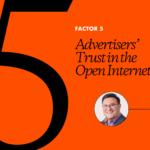Publishers, increasingly, are wary of Big Tech. Surveying the wreckage of the last decade—all those shutdowns, layoffs and disastrously failed pivots—one can certainly understand why. The big social platforms have not kept their promises, and the result is an industry in turmoil. But it’s important to remember that not every tech company is Facebook, an experiment of historically unprecedented scale with its own private (and often destructive) incentives. Technology really can empower publishers and expand audiences. It just depends on what technology you’re using.
To this point, the technology that publishers use has centered around third-party cookies. The entire social era—a beleaguered one for publishing, to say the least—has been defined by it. But as we know, cookies are on the way out, and first-party data—data collected directly from one’s audience—is on the upswing. The whole audience-relationship playbook is in the process of being rewritten. Whether that playbook is rewritten in publishing’s favor will depend in large part on their embrace of first-party data’s possibilities.
Harness the Power of Online Conversations
One place where the possibilities of first-party data are hyper-evident is with conversations. Over the last decade, the major social platforms have had a lock on discourse: when an article enrages a person, or delights them, they turn to their platform(s) of choice to talk about it. Few sources of data are richer than conversation, and the big platforms’ endless supply of it has helped to make them unimaginably powerful.
What if publishers could harness that power to their own advantage? After all, they’re the ones whose content is generating it. (Try to imagine a world without articles—what would people talk about on Twitter?) By using intuitive, well-moderated comment sections on their own domain, publishers can foster communities filled with frequent or even daily users. They can also, just as importantly, own a rich funnel of first-party data.
This is where the right technology comes in. Conversation is central to the OpenWeb enterprise: our AI- and Machine Learning-powered moderation tools, coupled with our community-based and human moderation, ensure high-quality conversation that keeps users engaged. User profiles, of course, are central to any viable online community, and our Identity tool makes these easy: publishers can incentivize registrations, and users can customize their profiles, building distinct personalities within publisher-owned ecosystems.
Keep Your Online Community Healthy
Building a vibrant, publisher-owned community is one thing; keeping that community healthy is another. Many online spaces, as we know, have a tendency to devolve into cauldrons of name-calling, arguing and (when things get really bad) harassment and hate speech. Anyone who’s spent more than an hour on the internet might think these were necessary evils—the price one has to pay for the miracle of digital connection. It’s not true—it never was. And OpenWeb can prove it.
Unlike on certain social platforms, our tools intentionally elevate those contributions to the conversation that are smart, thoughtful and even-keeled—as opposed to dumb, kneejerk and outraged. Facebook would have you think that this is a losing strategy—why else would they keep doubling down on toxicity?—but the fact is that people actually enjoy intelligent, measured discourse: look no further than the fact that when a leading US entertainment publisher partnered with OpenWeb, they grew their active user base by 1500%.
Minimize Toxicity Through High-Tech Moderation
How does OpenWeb help to reduce toxicity online? Well, picture a good high school teacher. A good high school teacher knows which student is likely to make an intelligent contribution to the discussion and which one is likely to derail the class with a fart joke. When the hands are raised, the teacher decides who to call on with this knowledge in mind. Same with OpenWeb. Our OS builds Civility Profiles on every user, using their past contributions to determine whether they’re likely to add or detract from the conversation. Moderation controls are tailored accordingly.
Everyone, of course, is allowed to speak, provided they don’t break the rules—but those with something useful to contribute have their voices elevated. OpenWeb incentivizes people to make quality contributions. Our Best Sorting feature, for instance, automatically pins the best comments to the top of the conversation, creating an atmosphere in which people want to make valuable contributions. In turn, people who might not have said anything to begin with are compelled to contribute positively themselves.
It’s a virtuous cycle. As we’ve learned from long experience, quality tends to beget quality when it comes to comments. The higher the caliber of the conversation, the more time users are likely to spend on your site. And the more time users spend on your site, the more opportunities you have to amass first-party data.
A Better Future for Publishers, and For Our Discourse
What we’re presenting here is a vision for a healthier internet. An internet where participating in the discourse doesn’t automatically feel terrible. An internet where advertisements are displayed to people based on what they’re currently reading, instead of creepy virtual dossiers compiled by unreliable data brokerages. An internet where publishers are robust and empowered—where the death-grip of the social platforms is finally broken. By absorbing the best lessons of Big Tech—and taking advantage of new technologies—publishers stand to make serious gains in the emerging post-cookie era.


